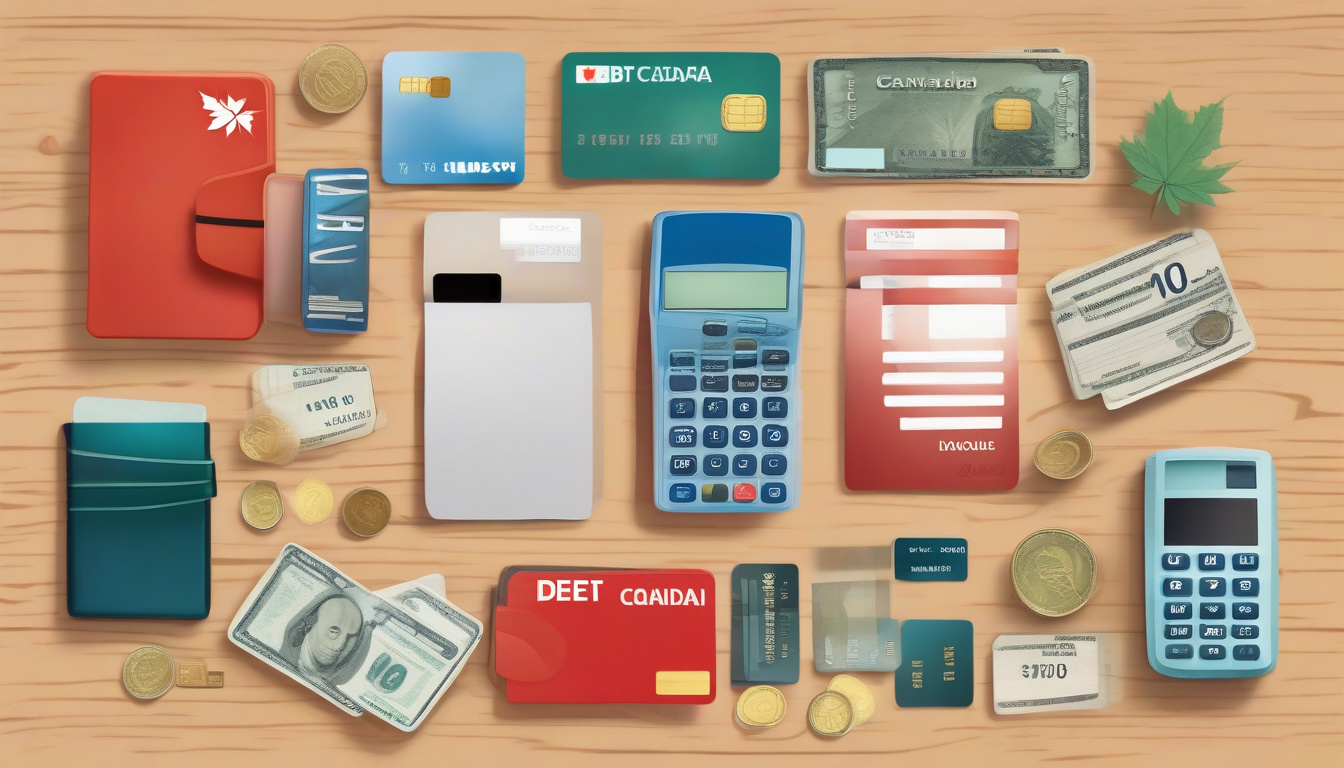Top Credit Cards for Debt Consolidation: Unlock Financial Freedom Today!
If you’re feeling overwhelmed by multiple debts and high interest rates, debt consolidation can be a powerful solution. By combining your debts into a single, more manageable payment, you can take control of your finances and start paving your way to financial freedom. One of the most effective methods of achieving this is through the use of credit cards specifically designed for debt consolidation. In this article, we will explore the best credit cards for debt consolidation, discuss key criteria to consider when selecting one, and highlight some of the top options available on the market. Additionally, we’ll examine the pros and cons of using credit cards for debt consolidation and provide valuable tips for successful debt management post-consolidation. Whether you’re looking to lower your interest rates or simplify your monthly payments, this guide will help you make informed choices to reach your financial goals.

Key Takeaways
- Debt consolidation can simplify your payments and lower interest rates.
- Choosing the best credit cards for debt consolidation involves assessing interest rates and fees.
- Top credit card options for debt consolidation often feature balance transfer capabilities and promotional APRs.
- Utilizing credit cards for debt consolidation has both benefits and drawbacks that need careful consideration.
- Post-consolidation, managing your debt wisely is crucial to maintaining financial health.
Understanding Debt Consolidation
Debt consolidation is a financial strategy that involves combining multiple debts into a single, more manageable payment. This approach is often used by individuals struggling with various types of debt, such as credit cards, personal loans, or medical bills, to streamline their financial obligations and reduce the total interest paid over time. Understanding how debt consolidation works is crucial for those seeking to regain control over their finances.
When considering the best credit cards for debt consolidation, it’s important to look for cards that offer low introductory interest rates, or even 0% APR for an initial period, allowing borrowers to pay off their existing debts without accruing additional interest. Additionally, features such as rewards programs, no annual fees, and balance transfer capabilities should be taken into account. For example, a card might offer a 15-month 0% APR on balance transfers, which can provide an excellent opportunity to clear debts if repaid within that timeframe.
Moreover, using a credit card wisely for consolidation can provide the flexibility needed to manage finances better, compared to traditional loans. However, it’s essential to also consider the potential risks, like accumulating more debt if new purchases are made on the card before the balance is paid off. Understanding these intricacies can empower individuals to make informed decisions about their debts and financial future.
Criteria for Choosing the Best Credit Cards
When searching for the best credit cards for debt consolidation, it’s essential to consider several key criteria that can make a significant difference in your financial health. First, look for cards that offer 0% introductory APR on balance transfers, which allows you to transfer high-interest debt without accruing interest during the promotional period. This feature can save you money and help you pay off your debt faster. Next, consider the balance transfer fees associated with the card; ideally, a card with low or no fees will minimize your overall expenses.
Additionally, evaluate the credit limit offered, as this will determine how much debt you can consolidate. A higher limit can provide more flexibility and reduce your overall credit utilization ratio, which positively affects your credit score. It’s also crucial to research the card issuer’s customer service reputation, as having responsive support can be vital in managing your finances effectively.
Finally, take a close look at the long-term interest rates for purchases and balance transfers after any introductory periods. For instance, if you anticipate needing to carry a balance after the promotional period ends, choosing a card with a lower ongoing APR can help in the long run. By carefully evaluating these criteria, you can identify the best credit cards for debt consolidation tailored to your specific financial needs.
‘The secret to getting ahead is getting started.’ – Mark Twain

Top Credit Cards for Debt Consolidation
When it comes to managing and eliminating debt, one of the most effective strategies is debt consolidation. By combining multiple high-interest debts into a single, more manageable payment, individuals can not only simplify their financial obligations but also potentially lower their overall interest rates. One of the best tools for consolidating debt is leveraging a credit card specifically designed for this purpose. Here, we will explore some of the best credit cards for debt consolidation, detailing their unique features, benefits, and suitability for different financial situations.
###
1. Chase Slate Edge
The Chase Slate Edge card is a great option for individuals looking to consolidate debt without incurring hefty fees. This card features an introductory 0% APR for the first 18 months on balance transfers, allowing users to pay down their existing debts without accruing interest during this period. Additionally, it charges no balance transfer fee, making it particularly attractive for those wanting to minimize upfront costs. After the introductory period, a variable APR applies based on creditworthiness.
###
2. Citi Simplicity Card
Another strong contender, the Citi Simplicity Card, also offers a 0% intro APR for 21 months on both balance transfers and purchases. This extended period gives cardholders sufficient time to pay down their consolidated debt while making it easier to manage monthly payments. Notably, there are no late fees or penalty rates, which can be a significant advantage for those who may occasionally miss payment deadlines.
###
3. Discover it Balance Transfer
The Discover it Balance Transfer card provides an appealing combination of a 0% APR on balance transfers for the first 18 months and a rewards program that offers 1-5% cash back on everyday purchases. This card stands out because Discover matches all cash back earned in the first year, effectively doubling the rewards for diligent users. Post-introductory, the APR ranges from
13.99% to
24.99% based on creditworthiness.
###
4. BankAmericard Credit Card
Ideal for those prioritizing a lower ongoing interest rate after their balance transfer, the BankAmericard Credit Card offers an introductory 0% APR for 18 billing cycles on balance transfers made in the first 60 days. The variable APR thereafter starts as low as
13.99%, which is beneficial for users who may carry a balance beyond the introductory period.
###
5. U.S. Bank Visa Platinum Card
For those needing more time to pay off their debts, the U.S. Bank Visa Platinum Card offers an impressive 0% APR on balance transfers for 20 billing cycles. This card does charge a balance transfer fee of either 3% or $5, whichever is greater, but with the extended 0% interest period, many users find it a worthwhile investment.
### Conclusion
Choosing the right credit card for debt consolidation depends on individual financial circumstances, including current debt amounts, interest rates, and the ability to make timely payments. By comparing these top options, you can select a card that not only helps streamline your debt payments but also sets you on a path toward financial recovery.
Pros and Cons of Using Credit Cards for Debt Consolidation
Pros and Cons of Using Credit Cards for Debt Consolidation
Consolidating debt with credit cards can be a viable option for many individuals looking to simplify their financial situation while reducing interest rates. However, it’s essential to weigh the advantages and disadvantages before making this financial decision.
### Pros
1. Lower Interest Rates: Many of the best credit cards for debt consolidation offer introductory 0% APR promotions for a set period, allowing you to transfer existing high-interest debt without accruing additional interest, which can help pay off your balances faster.
2. Simplified Payments: Using a single credit card to consolidate multiple debts means you’ll only have one monthly payment to manage, making your financial life a bit more manageable.
3. Potential Rewards: Some credit cards come with rewards programs or cash back options, which can provide additional benefits while you pay off your debts. This is especially advantageous if you can pay off the balance before the introductory period ends.
4. Increased Financial Flexibility: Credit cards often offer access to credit that can be leveraged in emergencies, providing a safety net if unexpected expenses arise during the consolidation process.
### Cons
1. High Regular Interest Rates: Once the promotional period ends, the interest rates may spike, leaving you paying high fees if the balance isn’t fully paid off. This can lead to a deeper debt spiral if not managed properly.
2. Credit Score Impact: Opening a new credit card increases your credit utilization ratio, which can negatively affect your credit score if you don’t maintain a low balance relative to your credit limit.
3. Fees: Many credit card companies charge balance transfer fees, which can add up significantly. It’s important to calculate if these fees outweigh the savings from lower interest.
4. Temptation to Accumulate New Debt: Having available credit can be tempting, leading individuals to accumulate additional debt rather than focusing on paying off what they originally consolidated.
### Conclusion
Using credit cards for debt consolidation can offer a fresh start for managing debt, but it’s crucial to approach the process with caution and a solid repayment plan. By understanding both the pros and cons, individuals can make informed decisions that align with their long-term financial goals.

Tips for Successful Debt Management After Consolidation
Successfully managing debt after consolidation involves a combination of strategic financial planning, consistent monitoring, and smart spending. Here are some essential tips to help you maintain control over your finances post-consolidation:
1. Create a Detailed Budget: Start by outlining your monthly income and expenses. Identify discretionary spending and prioritize necessary expenses. This will help you allocate funds towards paying off any remaining debts and avoid overspending.
2. Stay Organized: Keep track of all your debt repayment schedules, including interest rates and due dates. Utilize tools like apps or spreadsheets to monitor your progress, ensuring you never miss a payment and avoid late fees.
3. Use the Best Credit Cards for Debt Consolidation: Selecting the right credit card can streamline payments and reduce interest rates. Look for cards offering 0% introductory APR on balance transfers, as they can help you save on interest while paying off debts more quickly.
4. Maintain Emergency Savings: Allocate funds for unexpected expenses to prevent further debt. This will help you avoid relying on credit cards or personal loans in case of emergencies.
5. Limit New Credit Applications: While it might be tempting to apply for new credit cards, doing so might negatively impact your credit score. Focus on paying off existing debts first, and only apply for necessary credit in the future.
6. Consider Automatic Payments: Setting up automatic payments can ensure timely payments and help you avoid missed deadlines, which can be a source of additional charges.
7. Review Your Credit Report Regularly: Keep an eye on your credit report to track improvements in your credit score and identify any errors. Disputing inaccuracies promptly can help you maintain a healthy credit profile.
8. Seek Professional Guidance: If you find managing your financial situation challenging, consider consulting with a financial advisor or credit counselor. They can provide tailored advice and assistance based on your specific circumstances.
By implementing these strategies, you can not only manage your consolidated debt effectively but also pave the way for a stronger financial future.
Frequently Asked Questions
What is debt consolidation and how does it work?
Debt consolidation is a financial strategy that involves combining multiple debts into a single loan or credit card with the goal of reducing overall interest rates and simplifying payments. This can help manage debt more effectively.
What criteria should I consider when choosing the best credit cards for debt consolidation?
When selecting a credit card for debt consolidation, consider the interest rate, any balance transfer fees, promotional offers, and the duration of zero or low-interest periods. Additionally, evaluate the credit limit and your overall credit score.
What are some of the top credit cards for debt consolidation currently available?
Some of the top credit cards for debt consolidation may include cards offering 0% introductory APR on balance transfers, low fees, and favorable reward structures. Examples include the Chase Slate Edge, Citi Simplicity, and Discover it Balance Transfer.
What are the pros and cons of using credit cards for debt consolidation?
Pros include potentially lower interest rates, simplified payments, and faster debt repayment if managed well. Cons may include high-interest rates post-promotional periods, potential to accumulate more debt if spending is not controlled, and balance transfer fees.
What tips can help me manage my debt effectively after consolidation?
To manage your debt successfully post-consolidation, create a budget, avoid accumulating new debt, make regular payments on time, and consider setting up automatic payments. Additionally, review your financial plan regularly to adjust as necessary.
